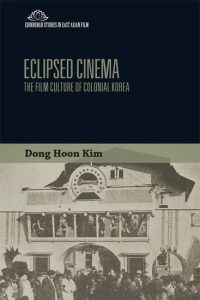Eclipsed Cinema – Dong Hoon Kim
Dong Hoon Kim, Assistant Professor of Korean Film, Literature, and Cultural Studies, has written a book, “Eclipsed Cinema: The Film Culture of Colonial Korea.” Kim’s work is ground-breaking, in that it investigates film culture of the early 20th century (1910-1945), which has not been widely studied or written about. Korea’s rule by Japan began at the end of the Korean Empire in 1910 and ended at the conclusion of World War II, in 1945, when U.S. and the U.S.S.R. captured the Korean peninsula.
Kim brings new perspectives to the nexus of colonialism, modernity, film historiography and national cinema that resulted in U.S./Russian rule. The result is the reconstruction of the lost intricacies of colonial film history, which is difficult to document. He examines the politics of colonial cinema, the colonial government’s own film-making unit, Hollywood’s reception to Korean cinema, in relation to the emerging Korean nationalism, the culture of Japanese settlers, and gendered film spectatorship. This book fills a significant void in Asian film history.
brings new perspectives to the nexus of colonialism, modernity, film historiography and national cinema that resulted in U.S./Russian rule. The result is the reconstruction of the lost intricacies of colonial film history, which is difficult to document. He examines the politics of colonial cinema, the colonial government’s own film-making unit, Hollywood’s reception to Korean cinema, in relation to the emerging Korean nationalism, the culture of Japanese settlers, and gendered film spectatorship. This book fills a significant void in Asian film history.